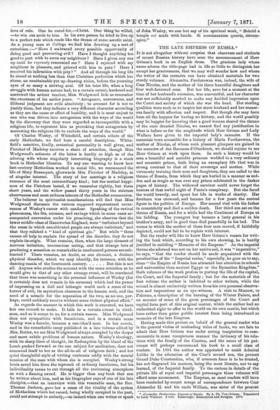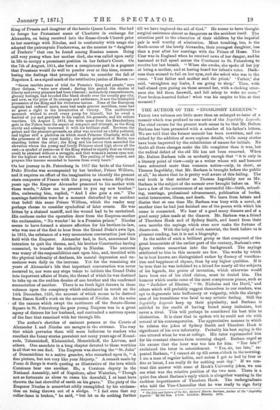THE LATE EMPRESS OF RUSSIA.* IT is not altogether without
surprise that observers and students of recent Russian history have seen the announcement of Herr Grimm's book in an English dress. The gracious lady whose name adorns the title-page had in life so little to distinguish her except her graciousness, that we may well wonder how and where the writer of the memoirs can have obtained materials for two sturdy volumes. Alexandra Feodorowna was, indeed, the wife of Czar Nicolas, and the mother of his three beautiful daughters and four well-favoured sons. But her life, save for a moment at the time of her husband's accession, was uneventful, and her character was not sufficiently marked to make any decided impression upon the Court and society of which she was the head. Her sterling qualities were such as to inspire her stern husband and her numer- ous family with affection and respect. But though she may have been all the happier for having no history, and the world possibly may be happier for knowing that a good woman shared the throne of the once dreaded Nicolas, we cannot find any justification in what is before us for the amplitude which Herr Grimm and Lady Wallace have given to the imperial lady's memoirs. If the materials were accessible for a history of Maria Feodorowna, the mother of Nicolas, of whom such pleasant glimpses are gained in the memoirs of the Baroness d'Oberkirch, we should rejoice to see Herr Grimm at work upon them. In such a history would be seen a beautiful and amiable princess wedded to a very ordinary and eccentric prince, both living an exemplary life that was in strong contrast to that of their sovereign and mother. While virtuously training their sons and daughters, they are called to the throne of Russia, from which they are hurled in a manner as sud- den and as tragic as was ever any prince celebrated in the darker pages of history. The widowed survivor could never forget the horrors of that awful night of Panin's conspiracy. But she faced the world bravely, and spent her life in works of charity. Her firstborn was crowned, and became for a few years the central figure in the politics of Europe. Her second vied with his father in eccentricity and died a sudden death. Her third son sat on the throne of Russia, and for a while had the Continent of Europe at his bidding. The youngest boy became a lusty general in his brother's army, and in good time died peacefully in his bed. The scenes in which the mother of these four men moved, if faithfully depicted, could not fail to be replete with interest.
But the reader will like to know Herr Grimm's reason for writ- ing the book which, according to his own showing, he is hardly justified in entitling " Memoirs of the Empress." As the imperial throne she adorned was not on her native soil, it was " imperative," he says, " that the reader should be made acquainted with the peculiarities of the " Imperial realm," especially, he goes on to say, since " the Empire of Russia has attracted less attention in schools and universities than ancient Egypt or the Byzantine Kingdom." Both volumes of the work profess to portray the life of the capital, the Court, and the Imperial family ; but for the materials of the first volume the author is indebted to other writers, while the second is almost exclusively written from his own personal observa- tion and impressions as an eye-witness. A visit to Moscow, to Palermo, a description of the burning of the Winter Palace, and an account of some of the great personages of the Court and capital form part of this original matter, which the author had an undoubted right to offer to the world on its own merits, but which loses rather than gains public interest from being introduced as memoirs of the late Empress.
Having made this protest on behalf of the general reader who is the general victim of misleading titles of books, we are fain to admit that Herr Grimm was under strong temptation to com- memorate in some conspicuous manner the intimacy of his rela- tions with the family of the Czarina, and the name of his pat- roness will perhaps recommend his book to a small class of readers. In 1834 the author was appointed to assist Admiral Liibke in the education of the Czar's second son, 'the present Grand Duke Constantine, who, if common fame is to be trusted, has not disgraced his masters, being the most literate, not to say learned, of the Imperial family. To the curious in details of the private life of royal and imperial personages these volumes will afford some amusement. The Empress, as most readers will have been reminded by recent scraps of correspondence between Czar Alexander II. and his uncle William, was sister of the present * Alexandra Feodorowna, Empress of Russia. By A. Th. Von Grimm. Translated by Lady Wallace. 2 vols. Edinburgh: Edmonton and Douglas. 1870.
King of Prussia and daughter of the heroic Queen Louise. She had to forego her Protestant name of Charlotte in exchange for Alexandra, on being received into the Russo-Greek Church prior to her marriage with Nicolas, and in conformity with usage she adopted the patronymic Feodorowna, as the nearest to "daughter of Frederic " that can be found among Russian names. Being still very young when her mother died, she was called upon early in life to occupy a prominent position in her father's Court. On the 7th of August, 1814, she bore a conspicuous part in a pageant that Prussians would do well to ponder over at this time, remem- bering the feelings that prompted them to consider the fall of Napoleon L as a signal mark of the retributive justice of Heaven :-
"Seven terrible years of trial for Prussia's King and people," says Herr Grimm, "were now closed ; during this period the strains of liberty and every pleasure had been silenced ; melancholy remembrances, gloomy feelings, had brooded like black clouda over the usually gay city, and now, as the price of its courage and endurance, it saw the triumphal procession of the King and his victorious heroes. None of the European capitals had suffered more, none had made greater sacrifices, none had so great a right to the intoxication of victory. The unobtrusive monarch wished to avoid every pomp for himself, but he owed a festival of joy and gratitude to his capital, his generals, and his valiant warriors. On August 7, 1814, the wide space from the Brandenburg gate to the Palace bore the aspect of conquest and triumph, as the King slowly and solemnly traversed it with his brilliant staff. Between the palace and the pleasure-grounds, an altar was erected on a lofty pedestal, and higher still a platform on which stood Princess Charlotte, with all the princesses of the royal family ; the whole priesthood of Berlin was standing before the altar ; the King and his heroes then ascended the elevation where the young and lovely Princess stood high above all the rest—a symbol of peace—as if the King wished to signify that on victory could be attained without a struggle, and that woman's serene eyes con- fer the highest reward on the victor. The pealing of bells ceased, and prayers like incense ascended to heaven from every heart."
-On her journey to St. Petersburg in 1817 the bride of the Grand Duke Nicolas was accompanied by her brother, Prince William, and it requires an effort of the imagination to identify the present stern conqueror of France with the young man whom fifty-three years ago the Emperor Alexander presented to his mother with these words, "Allow me to present to you my new brother." She, embracing him, replied, " And I also gain a son." The marriage festivities were for a moment disturbed by an accident that befell this same Prince William, which the reader may perhaps choose to consider symbolical of later events. He was bitten by a chained mastiff, and the wound had to be cauterized. His coolness under the operation drew from the Empress-mother the exclamation, " No wonder ! he is a Prussian prince." Nicolas seems to have formed a sincere affection for his brother-in-law, who was one of the first to hear from the Grand Duke's own lips, an 1819, the substance of a very momentous conversation just then held with the Emperor. Alexander had, in fact, announced his intention to quit the throne, and, his brother Constantine having consented, to transfer his authority to Nicolas. The autocrat was weary of the responsibilities cast upon him, and, troubled with the physical infirmity of deafness, his mental depression and un- easiness were daily on the increase. Yet for the remaining six years of Alexander's life that important conversation was never recurred to, nor were any steps taken to initiate the Grand Duke into important affairs of State, the thread of which he was destined to take up on the sudden demise of one brother and the confirmed renunciation of another. There is no fresh light thrown in these volumes upon the conspiracy which culminated in revolt on the 14th December, 1825, the account of which seems to be derived from Baron Korff's work on the accession of Nicolas. At the noise of the cannon which swept the mutineers off the Senate-House Square in St. Petersburg the poor young Empress was in a great agony of distress for her husband, and contracted a nervous spasm of the face that remained with her through life.
The author's sketches of eminent persons at the Courts of Alexander I. and Nicolas- are meagre in the extreme. The rosy tint which pervades them will seem ludicrous to readers who recollect the funny stories prevalent not many years ago of Nes.sel- rode, Tchernicheff, Kleinmichel, Menschikoff, the Lievens, and others. One anecdote in a long chapter devoted to these worthies is all that we can find. The Empress was showing the " St. John" of Domenichino to a native grandee, who remarked upon it, " A fine picture, but not very like your Majesty." A remark made by Pozzo di Borgo is worth quoting as illustrative of the love which Corsicans bear one another. He, a Corsican deputy in the National Assembly, said of Napoleon, after Waterloo, " Though not so fortunate as alone to cause his downfall, I at least have thrown the last shovelful of earth on his grave." The piety of the Emperor Nicolas is somewhat oddly exemplified by his exclama- tion on being thrown out of a sledge. " I feel sure that my collar-bone is broken," he said, "but let us do nothing further
till we have implored the aid of God." He seems to have thought surgical assistance almost as dangerous as the accident itself. The attention paid to the education of their children by the imperial pair is well worthy of admiration. Most touching, too, is the death-scene of the lovely Alexandra, their youngest daughter, less than a year after her marriage with the Prince of Hesse. The Czar was in England when he received news of her danger, and he hastened at full speed across the Continent to St. Petersburg to receive her last breath. " When she awoke, she spoke of her joy at being a mother, and at having heard her infant's voice. Dark- ness then seemed to fall on her eyes, and ahe asked who was in the room. Your father and mother and the priest.' Father,' she said, 'straighten my limbs, I am going to sleep.' Then, with half-closed eyes gazing on those around her, with a choking utter- ance she bid them farewell, and fell asleep to wake no more." Poor broken-hearted father ! what was his empire to him at that moment ?































 Previous page
Previous page